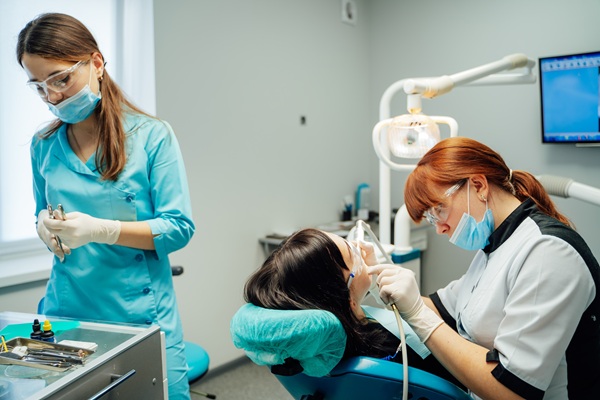Can Teeth Cleaning Damage the Teeth?

Professional teeth cleaning in general dentistry is an essential part of maintaining good oral health. However, some patients are curious to know if they can cause damage to their teeth. While it is rare, understanding the possibility can be helpful.
What to know about possible damage from teeth cleanings
Individuals who undergo professional teeth cleanings on a regular basis may be at risk of weakening their teeth. The products that general dentists use for teeth cleanings are extremely strong, which is good for mineralizing twice a year. However, it can weaken the enamel if overused. Generally speaking, individuals are recommended to only undergo two professional teeth cleanings a year. That said, some require or desire more frequent visits, which is what can lead to damage.
When professional teeth cleanings are undergone on a frequent basis, it is important that certain measures are taken to ensure that the teeth remain strong and intact. Consulting with a dentist about specific tips can be helpful, though there are a few general things that can be done.
- Undergo fluoride application to ensure that the enamel remains strong
- Request that the general dentist use gentler products during the teeth cleaning
- Avoid abrasive oral hygiene products at home
- Limit extremely hot or cold foods and beverages, such as ice cream or hot coffee
Routine
It is important to understand that routine teeth cleanings in general dentistry will not put the teeth in harm's way. General dentists are skilled and trained to properly care for teeth, which means they will not overperform cleanings. Additionally, those who are worried about the possibility can consult with a general dentist to better understand ways to prevent damage from occurring.
At-home care
Just like with professional teeth cleanings, it is also possible to overdo oral hygiene at home. Individuals should brush their teeth twice a day or after every meal; overdoing it can result in damage similar to too-frequent professional cleanings. When brushing, they should not brush their teeth too hard. Otherwise, they may damage both their teeth and their toothbrush.
Additionally, it is good to know that brushing techniques play a role. When the teeth are regularly cleaned using a hard- or medium-bristled toothbrush, there is a risk that the enamel will break down over time, which can result in long-term damage. General dentists recommend the use of a soft-bristled toothbrush for everyday teeth cleaning. Medium- and hard-bristled brushes should be used sporadically and on rare occasions when recommended by a dentist. Toothbrushes and brush-heads for electric toothbrushes should be replaced every three months.
Find out more about teeth cleaning practices
Would you like more information about professional teeth cleanings and at-home oral hygiene? The Perry Street Dental team is here to answer your questions. Call our office to learn more or to schedule your next appointment.
Request an appointment here: https://www.mynewnandentist.com or call Perry Street Dental at (770) 400-9933 for an appointment in our Newnan office.
Check out what others are saying about our dental services on Yelp: Professional Teeth Cleaning in Newnan, GA.
Related Posts
Dental crowns are a reliable and durable solution for restoring the appearance and function of damaged teeth. While dental crowns are designed to last years, proper care and maintenance are essential for extending their lifespan. Following practical steps and working closely with your dentist can protect your investment and enjoy a confident smile for years.Maintaining…
A family dentist provides comprehensive dental care for patients of all ages, making it convenient to address the oral health needs of everyone in the family. From preventive services for children to restorative and cosmetic treatments for adults, a family dentist ensures each family member enjoys a healthy, radiant smile. By focusing on personalized care…
A preventive dentist focuses on maintaining a patient’s oral health and preventing problems, such as sensitive teeth, from becoming more serious issues, like gum disease. This typically involves routine dental checkups, cleanings, and oral health screenings. By focusing on prevention, patients have a better chance of avoiding the need for more extensive and costly treatments…
A dental bridge works by filling up the gaps created by lost teeth. Dental implants or crowns support the pontic or prosthetic tooth from either side. Dental bridges provide many benefits, including improving one's ability to eat and communicate. They help protect the jawbone and stop the rest of the teeth from moving into the…
